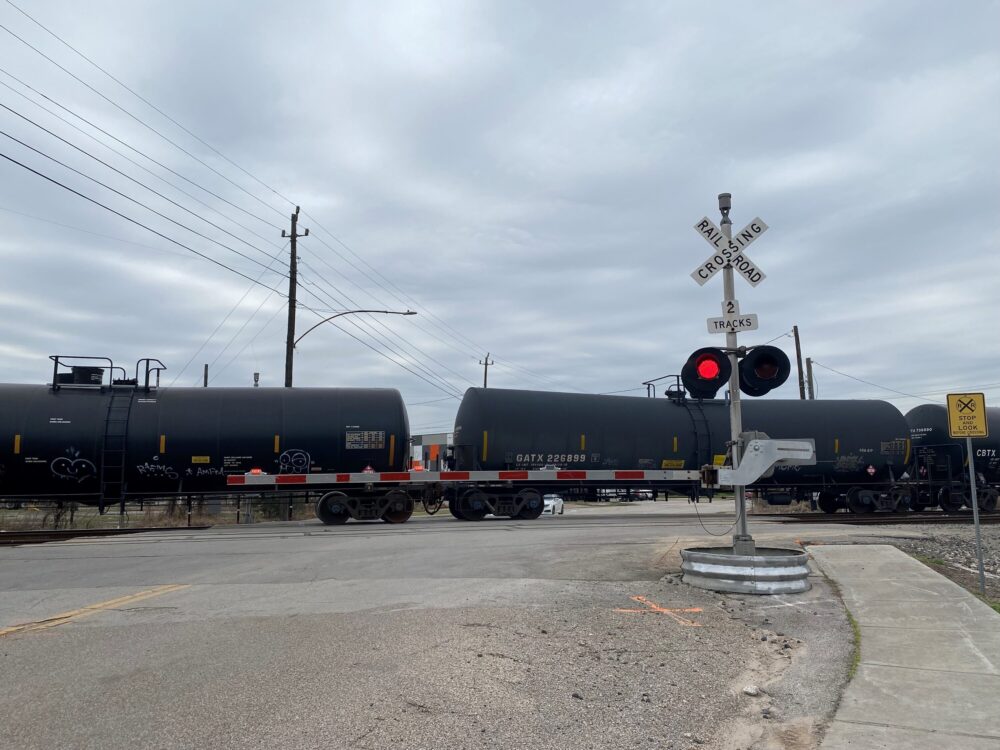
Houston has some of the worst blocked crossings in the state, and residents are fed up. State and local leaders are urging Congress to pass a bill that could help reduce blocked train crossings in Houston's East End.
The Railway Safety Act is a bipartisan senate bill that would address safety requirements for rail carriers and trains transporting hazardous materials. It was introduced in the senate in March, after the hazardous trail derailment in East Palestine, Ohio. The bill would require trains to provide advance notices and information about hazardous materials, a minimum two-person crew, and wayside detectors which are used to detect train defects and failures.
Mayor Sylvester Turner is pushing for the bill because it aims to reduce the number of blocked rail crossings which is a problem Houston is too familiar with. According to the city, Houston's East End tops the nation with the highest incidents of blocked railroad crossings, like the train tracks at Milby Street in Second Ward.
"Block crossings create community instability, affecting public safety and quality of life, and it is important that we act and we act now," he said.
Trains often block traffic for hours, limiting mobility for residents and emergency responders. Houstonians are not able to go to work, school, or even get home due to the delayed trains. City of Houston's Fire Chief Samuel Pena said it's a public safety issue.
"We do track the number of times that our emergency response vehicles have to divert or change direction as a result of a blocked train," he said “We’re averaging about 90 instances per month, and those are emergency responses that are impacted as far as the time it takes us to get to that emergency."
According to city officials, there are over 700 active and busy trains within Houston city limits alone. Mayor Turner said each day about 114 trains operate throughout the city, and at times that number increases to 124 a day, with many trains stretching over a mile long.
District I Council Member Robert Gallegos represents the East End. He said with most of the busy trains being in his district, he's witnessed the negative impact it’s having on residents.
"In the last few years we have seen significant increases in rail traffic that have impacted safety, mobility and the overall quality of life of our neighborhoods.
Gallegos said 1,300 of the state’s 2,800 railroad complaints came from Houston's Eastside. He said blocked crossings could get worse with the recent merger of several large railroad companies that could send more train traffic through Houston – which is already an issue with three rails in the area.
"On the east side is the presence of three highly active rail corridors that criss-cross our community forming a triangle dubbed the train trap triangle," he said. "On a regular basis one of two of these tracks is occupied by stop trains multiple times per day – blocking numerous streets and critical crossings."
City officials said with prolonged blockages it leaves residents to take unsafe routes like climbing over or under trains to get across.
Martha Gill is the Co-founder of Segundo Coffee Lab that sits next to the train tracks. She said the stopped trains affect her as an East End resident and a business owner.
"There’s times where the train sits three to four hours and privately owned business is affected up to 40 to 50% negatively," she said. The most important thing that I want to say is that the stress and the chaos that it causes when you’re driving or taking your child to school, and the school doesn’t even have anything in place to be able to help prevent this."
In a 16-11 vote, the bill was approved out of the U.S. Senate Committee on Commerce, Science and Transportation last week and will head to the senate floor for a vote. Texas Senator Ted Cruz was one of the no votes.
"Unfortunately at this stage I can not support the results," he said "I worry these new rule makings and authorities empower Secretary Buttigeg and the Biden Administration to further and aggressively restrict the movement of American energy products."
This story has been updated to reflect that Milby Street is in the Second Ward.

 66 °F
66 °F